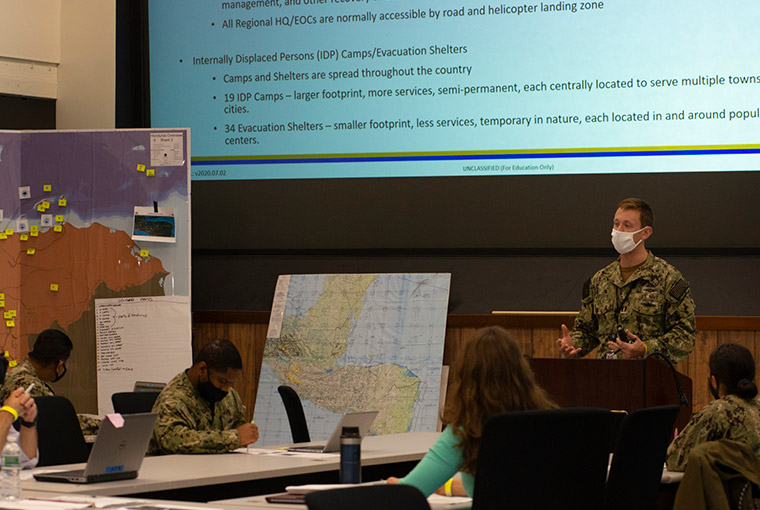NWC Adapts in COVID-19 Environment

Newport, RI - The College of Maritime Operational Warfare (CMOW) at theU.S. Naval War College (NWC) in Newport, Rhode Island provides short duration, classified and unclassified education and consulting to military officers and their commands across the U.S. Navy, the Joint service and U.S. partner nations.
Traditionally, CMOW courses are conducted at NWC or at fleet concentration areas around the globe. These courses range from one week to three months. On average, CMOW’s efforts reach over 1,000 officers and 100 flag officers annually. Navy readiness at the maritime operational level of war depends on CMOW’s ability to effectively reach these critical students.
Recently, NWC provided customized training adapting to the COVID crisis for the Maritime Staff Operators Course (MSOC), International Maritime Staff Operators Course (IMSOC) and Maritime Operational Planners Course (MPOC). Courses more than one week long have incurred the required 14-day restricted operational movement (ROM) order. To date, more than 140 students have been through the CMOW hybrid courses.
“We have discovered many challenges, from having the appropriate infrastructure in temporary lodging that permitted effective distance education to remaking curriculum to fit in a distance learning model,” said Dean Michael White, College of Maritime Operational Warfare (CMOW). “We continue to learn with every class, both international and U.S., and improve our hybrid model of learning.”
For the MPOC course, instructors developed a comprehensive educational approach, learning about online teaching techniques. Then, instructors tailored their lectures for virtual education and conducted rehearsals of those lectures and their subsequent practical exercises.
When the faculty examined the MSOC syllabus, they put together a two week “ROM” period of virtual learning that could be done remotely in a safe, secure environment. During this period, they taught the theory portion of the class. Faculty used several on-line collaboration platforms with the help of the teaching excellence center.
After ROM, the students attended in-person classes. Even during the in-person instruction periods, the hybrid option of instruction was always available. Students and instructors could listen or teach using live audio transmission and view classroom instruction through the Blackboard website.
Another challenge was class size, normally 25-30 students. While classes remain that size, the faculty divided the students in groups of 15 or less to ensure social distancing requirements were met. The group training was completed in an environment with some groups learning in remote locations or in nearby classrooms. This unique structure provided consistency across entire classes, critical for effective collaboration on operational planning exercises, yet protecting students and faculty.
The result was a robust hybrid course that included both academic and hand-on, practical application.
Other NWC’s CMOW courses
For CMOW one-week courses offered in Newport or at Navy operational fleet commands, the college adopted a virtual solution. The students joined from their workplace, in the virtual environment, and were taught a few hours each day.
While not the traditional classroom instruction, the courses provide unique educational opportunities. Courses taught under this program included the executive operational level of war course, tailored humanitarian response training to operational staff course, and the broader staff officer course. CMOW recently completed this remote training program to over 160 Indonesian officers.
Similarly, CMOW migrated their tailored, in-person flag officers education to a hybrid teaching model as those flag officers prepared for their follow-on assignments. Over 12 flags officers have since completed this virtual experience with positive results.
In addition, flag officers were unable to travel to the fleet headquarters for the CFMCC courses due to COVID, so CMOW moved to a virtual symposium model, reaching over 50 flag officers in a recent event for 5th Fleet. The CMOW Assist and Assess Team developed a virtual boot camp course for four different fleet headquarters, helping those personnel who could not attend one of the resident courses during the stop-movement order. The team facilitated discussions on planning and MOC processes to better prepare those officers to serve in their future MOCs.
For the MPOC course, Associate Professor Mike Lents was impressed by the agility demonstrated by the faculty changing their teaching techniques and the students embracing the new learning environment.
“We are able to adapt and provide a challenging program for the students,” said Lents. “For me, the real heroes are the faculty and staff who put in the extra work creating a comprehensive program in this unique, challenging COVID-19 environment. Then, the students, faculty and staff all worked and studied together as a team completing the course and its objectives.”
“I could not be prouder of our faculty and staff as they developed a hybrid solution for our courses,” said White. “This education is critical for the fleet, and we needed to do it effectively in the COVID environment. The team was innovative and relentless in finding solutions so that we could continue to support operational units with well-prepared, educated personnel. We will continue to refine our techniques.”
The in-residence courses are intensive experiential learning events, grounded in specific measures of effectiveness with student outcomes derived from Bloom’s taxonomy in order to meet the requirements for receiving a Navy Additional Qualification Designation (AQD). Students are introduced to the operational level of war and must demonstrate their knowledge of the battle laboratories and table-top exercises. In the coming weeks, CMOW will host a virtual Rochefort Dialogue workshop next month in lieu of the planned in-person Rochefort Workshop.
